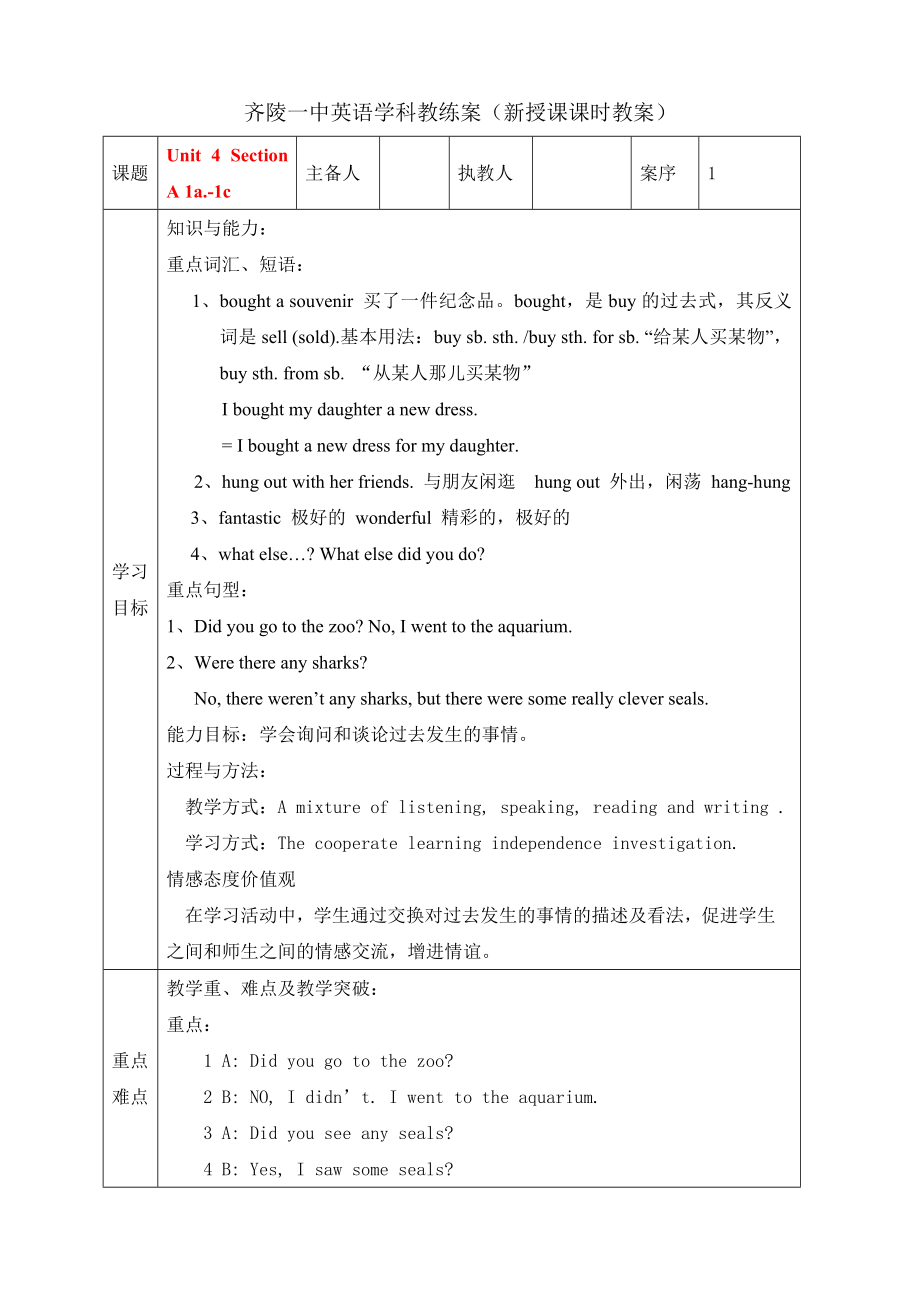《七年級(jí)英語unit4 how was your trip_ 第一課時(shí)教案人教版》由會(huì)員分享,可在線閱讀�,更多相關(guān)《七年級(jí)英語unit4 how was your trip_ 第一課時(shí)教案人教版(3頁珍藏版)》請(qǐng)?jiān)谘b配圖網(wǎng)上搜索。
1�����、此資料由網(wǎng)絡(luò)收集而來�,如有侵權(quán)請(qǐng)告知上傳者立即刪除。資料共分享��,我們負(fù)責(zé)傳遞知識(shí)�。
齊陵一中英語學(xué)科教練案(新授課課時(shí)教案)
課題
Unit 4 Section A 1a.-1c
主備人
執(zhí)教人
案序
1
學(xué)習(xí)
目標(biāo)
知識(shí)與能力:
重點(diǎn)詞匯、短語:
1��、 bought a souvenir 買了一件紀(jì)念品���。bought�,是buy的過去式����,其反義詞是sell (sold).基本用法:buy sb. sth. /buy sth. for sb. “給某人買某物”, buy sth. from sb. “從某人那兒買某物”
I bought my daughter
2��、a new dress.
= I bought a new dress for my daughter.
2、hung out with her friends. 與朋友閑逛 hung out 外出���,閑蕩 hang-hung
3�、fantastic 極好的 wonderful 精彩的��,極好的
4�、what else…? What else did you do?
重點(diǎn)句型:
1�����、Did you go to the zoo? No, I went to the aquarium.
2���、Were there any sharks?
No, there weren’t an
3�、y sharks, but there were some really clever seals.
能力目標(biāo):學(xué)會(huì)詢問和談?wù)撨^去發(fā)生的事情��。
過程與方法:
教學(xué)方式:A mixture of listening, speaking, reading and writing .
學(xué)習(xí)方式:The cooperate learning independence investigation.
情感態(tài)度價(jià)值觀
在學(xué)習(xí)活動(dòng)中��,學(xué)生通過交換對(duì)過去發(fā)生的事情的描述及看法����,促進(jìn)學(xué)生之間和師生之間的情感交流,增進(jìn)情誼�。
重點(diǎn)
難點(diǎn)
教學(xué)重�、難點(diǎn)及教學(xué)突破:
重點(diǎn):
1 A: Did
4����、you go to the zoo?
2 B: NO, I didn’t. I went to the aquarium.
3 A: Did you see any seals?
4 B: Yes, I saw some seals?
5 A: Were there any sharks?
6 B: No, there weren’t.
難點(diǎn):To talk about events in the past.
To learn about the past forms of verbs.
學(xué) 習(xí) 內(nèi) 容 與 流 程
一、情景創(chuàng)設(shè)����,導(dǎo)入新課
Warming u
5、p by asking past activities
T:Hello, everyone! The weather today is very fine. It was fine yesterday. What did you do yesterday? Sally, did you buy any bananas after school?
S:No, I didn’t.
T:Ann, were you at home in the evening?
S:No, I wasn’t.
T:Right! When we talk about the events in the pa
6�����、st, we should use the past forms of verbs.
Do—did, buy---bought, go—went, and see---saw
二�����、自主學(xué)習(xí)��,合作探究 ��,師生互動(dòng)
1a:Talking about your last school trip
Do you still remember your last school trip?Now you can talk with your partner what you did and make a list. For example:Did you…? Were you…?
Ok! You
7����、 can read your list to the class
went to the beach
did some shopping
had ice cream
played volleyball on the beach
swam in the sea
picked up the shells
1b:Listening and circling
School trips are always interesting and exciting. Many of you had a good memory of your own. Boys and girls, pleas
8�、e read these phrases after me.
Now please listen to the tape and circle the expressions in the box. I will Play the tape twice.
Check the answers
1c:Doing pairwork
Now let’s practice a dialogue then look at the picture at the top of the page and answer questions like this:
Then ask several pa
9���、irs to present your conversations to the class.
三��、點(diǎn)撥升華
去海灘: 冰淇淋����; 去動(dòng)物園:
照相��; 去水族館�; 閑逛:
看海豹: 買紀(jì)念品: 一位著名演員
四����、達(dá)標(biāo)反饋:
一、按要求寫單詞或詞組���。
visit(名詞)________ gift(同義詞)��__________ 與某人閑逛_____________
去水族館_________________買一件紀(jì)念品__________________
吃了一個(gè)漢堡包______
10�、____________看見了一些鯊魚_______________
二�、句型轉(zhuǎn)換
1、There were some sharks there.(改為一般疑問句)
_______ ________ _______sharks there?
2�、I bought a souvenir.(改為否定句)
I _________ _______ a souvenir.
3、We went to the beach last Sunday.(就劃線部分提問)
________ _______ you _______ to the beach?
板書設(shè)計(jì)
1.What else did you do?
2 How was your school trip?
3��、Tina got Jake Dean’s autograph.
4���、There were many actors at the aquarium.
5�、Did you take any photos?
反思
與
重建
 七年級(jí)英語unit4 how was your trip_ 第一課時(shí)教案人教版
七年級(jí)英語unit4 how was your trip_ 第一課時(shí)教案人教版

